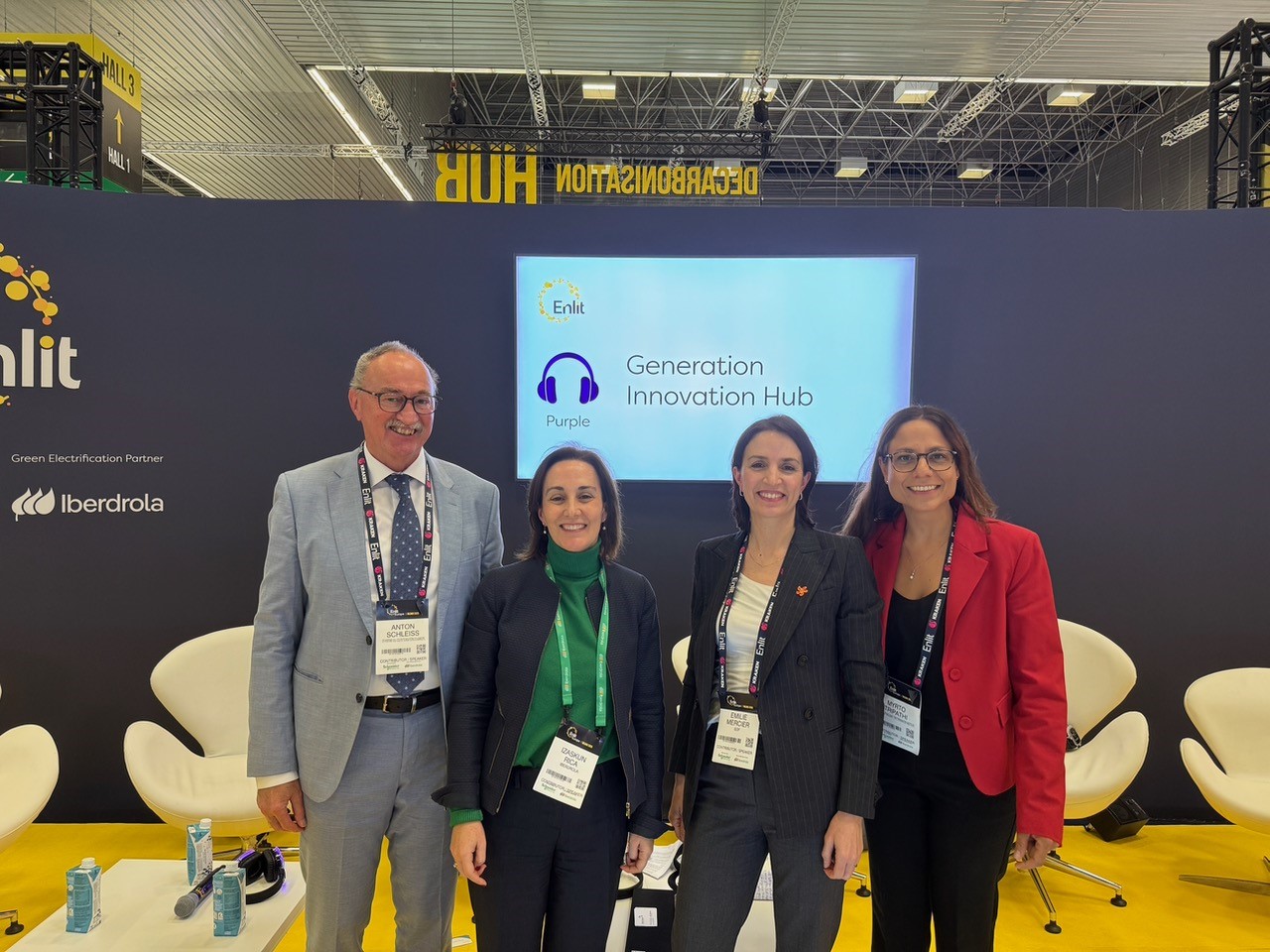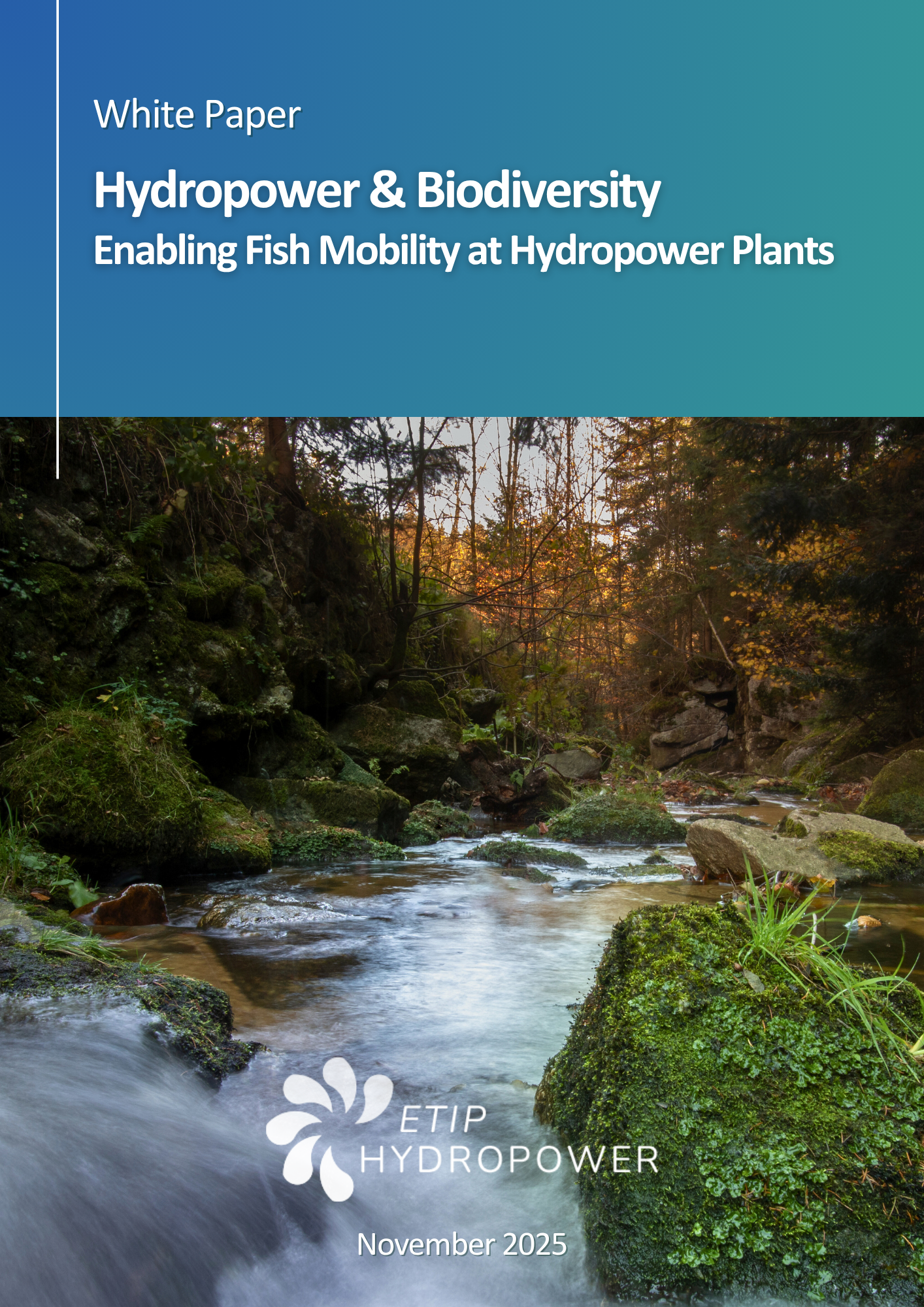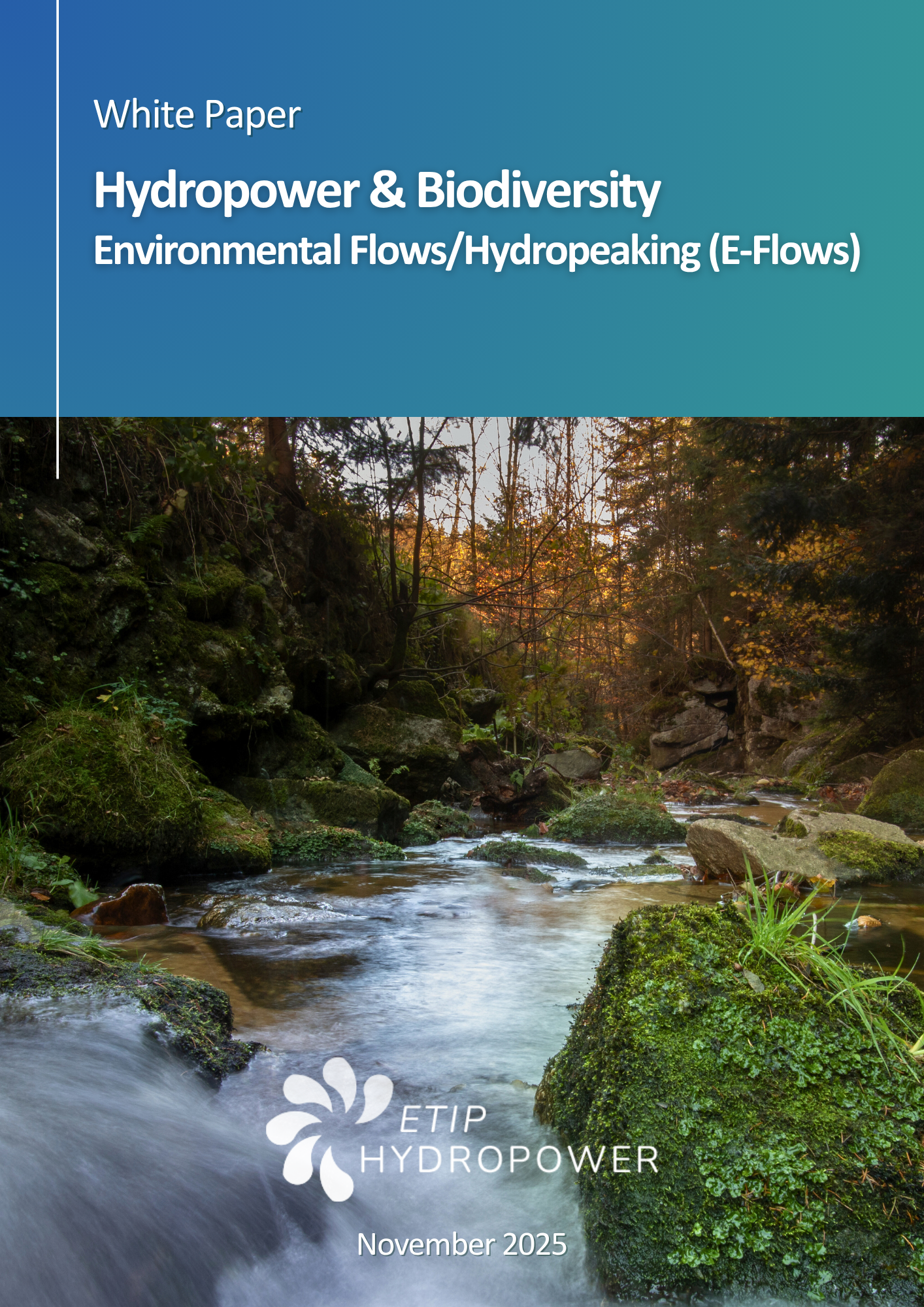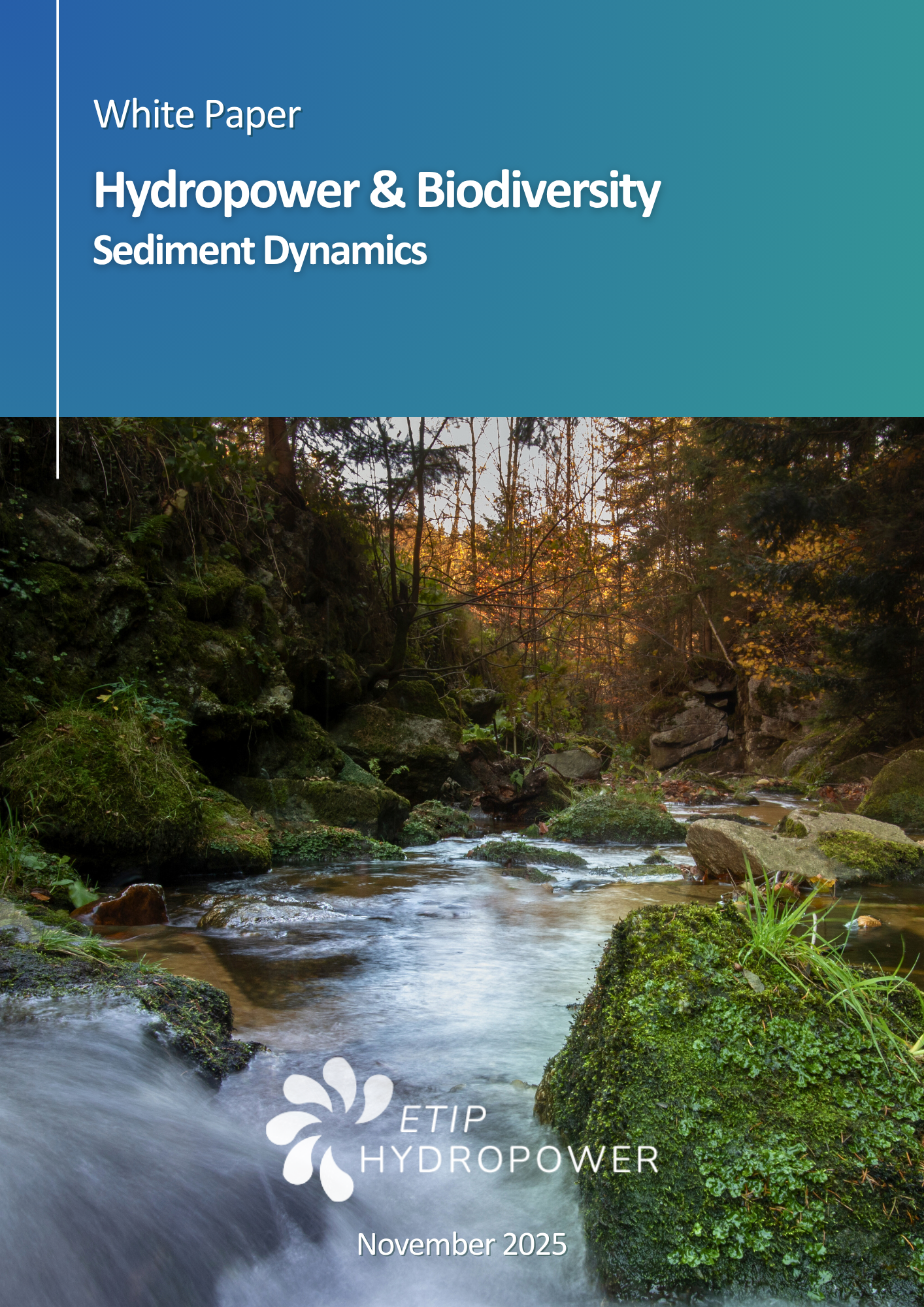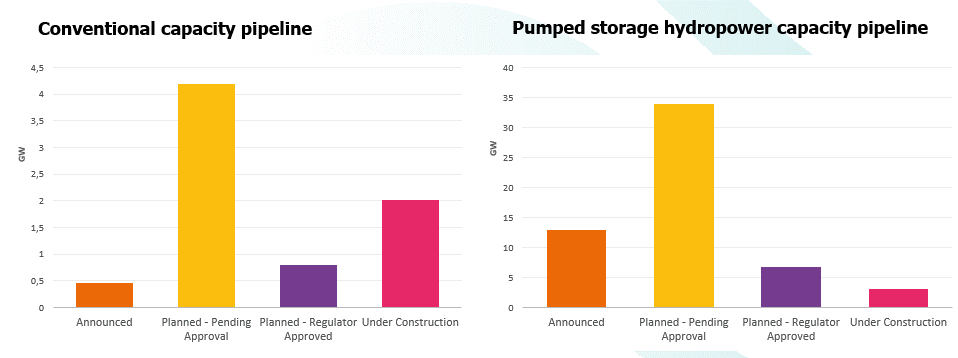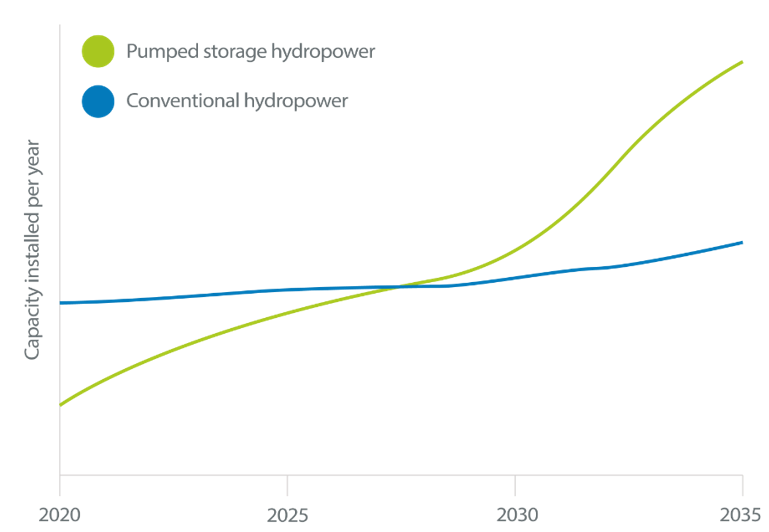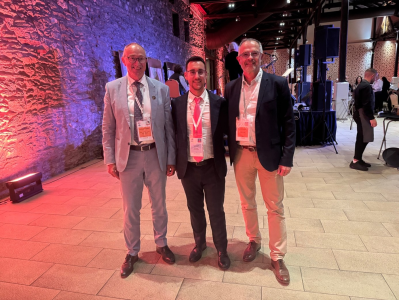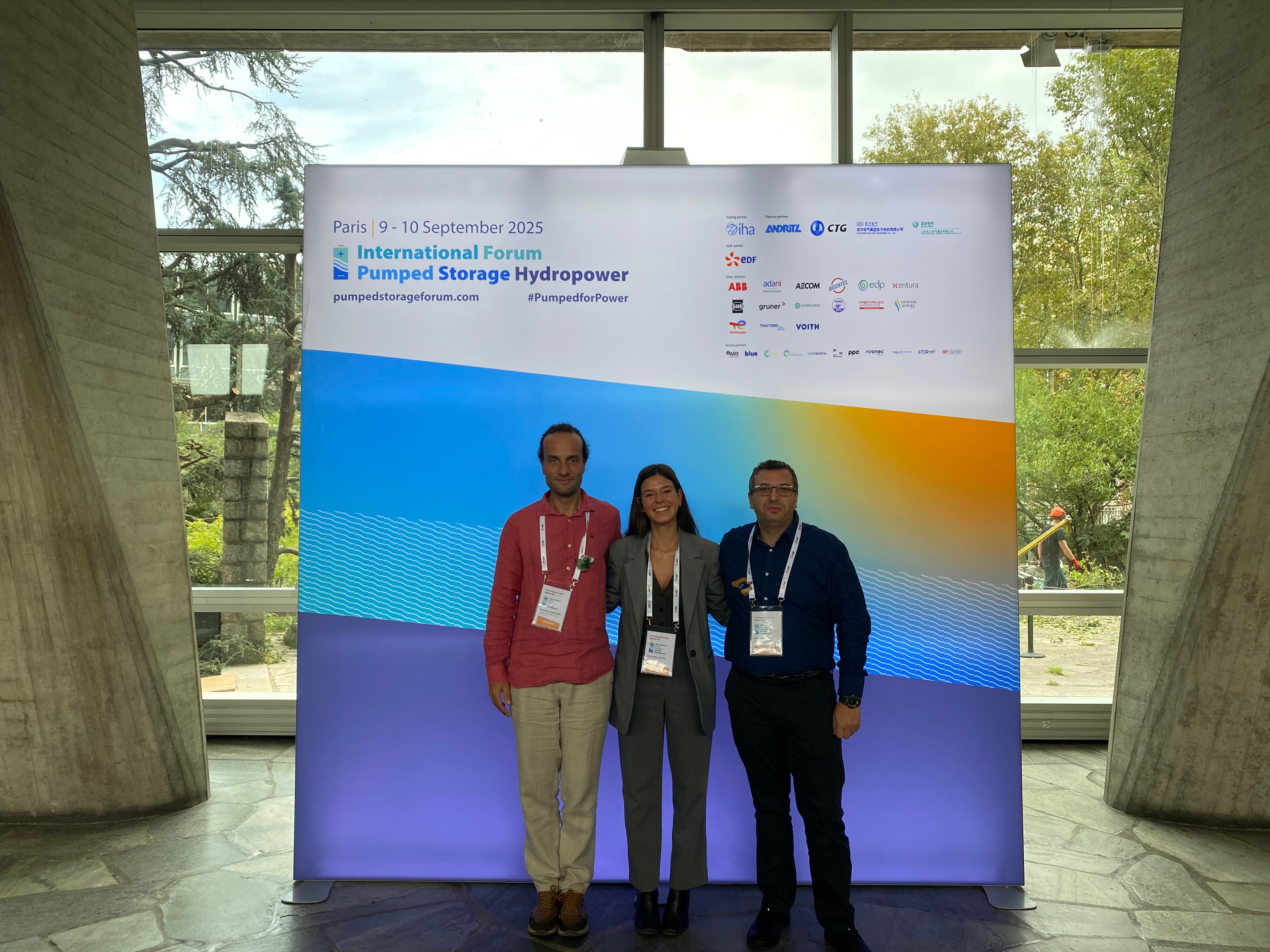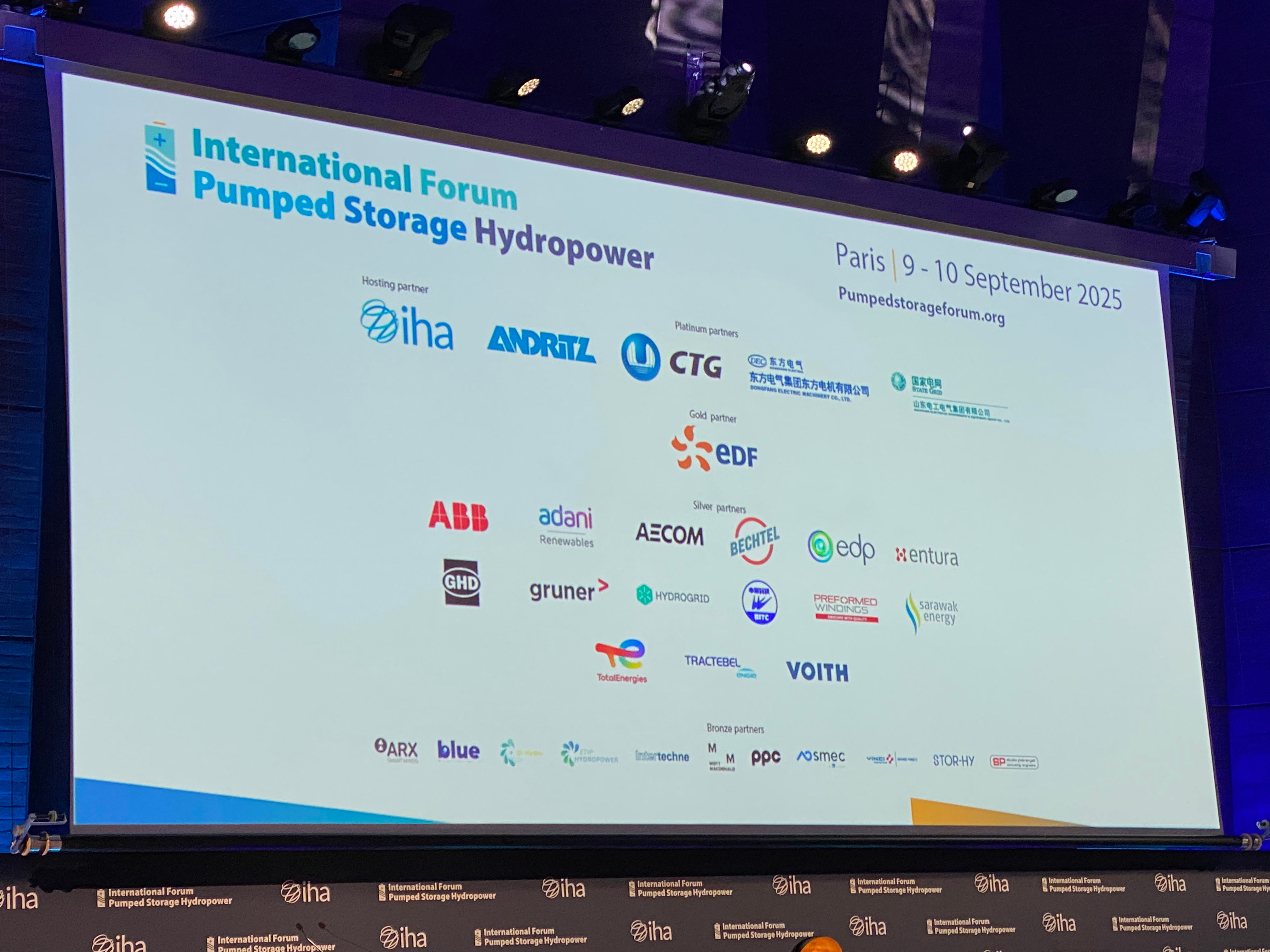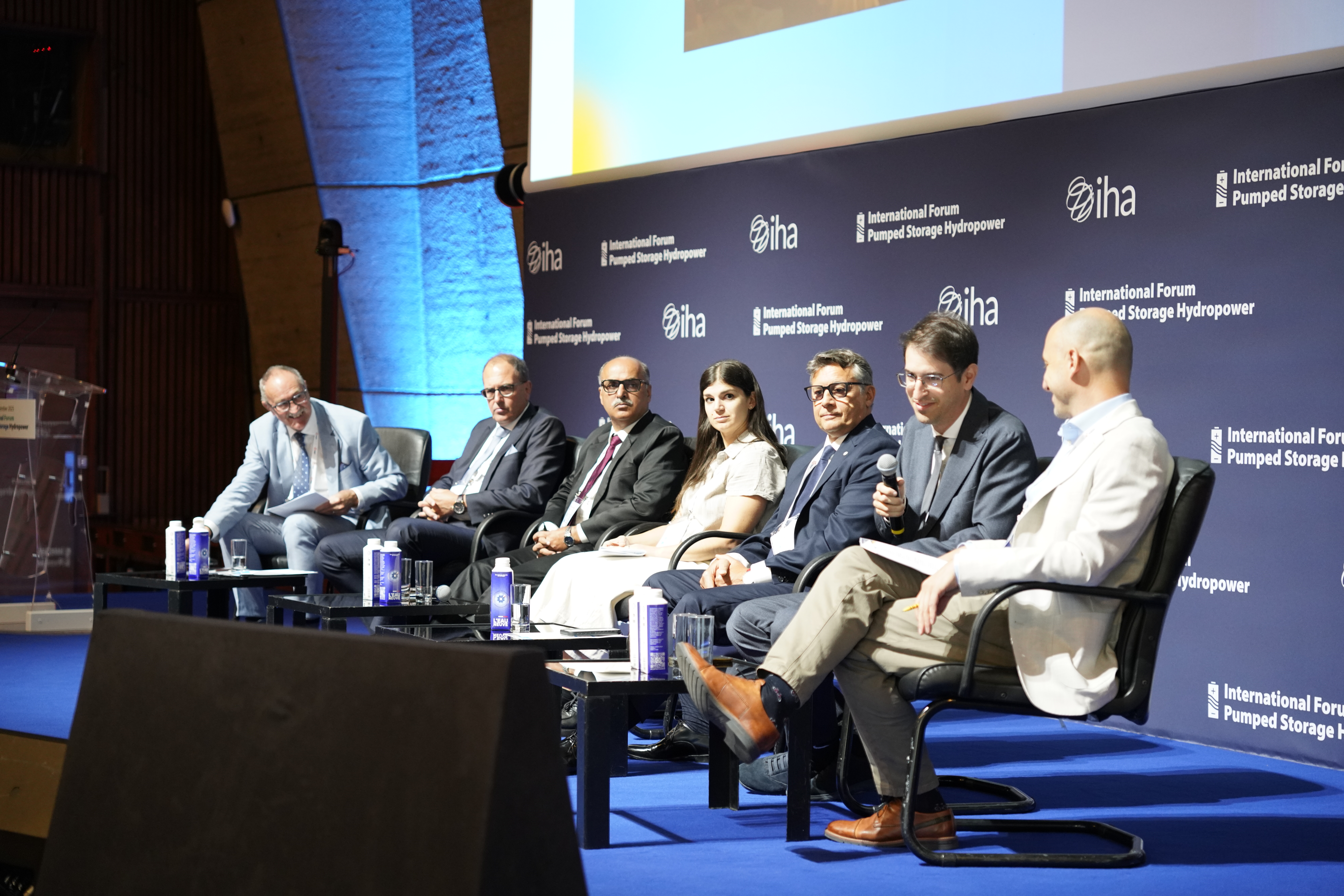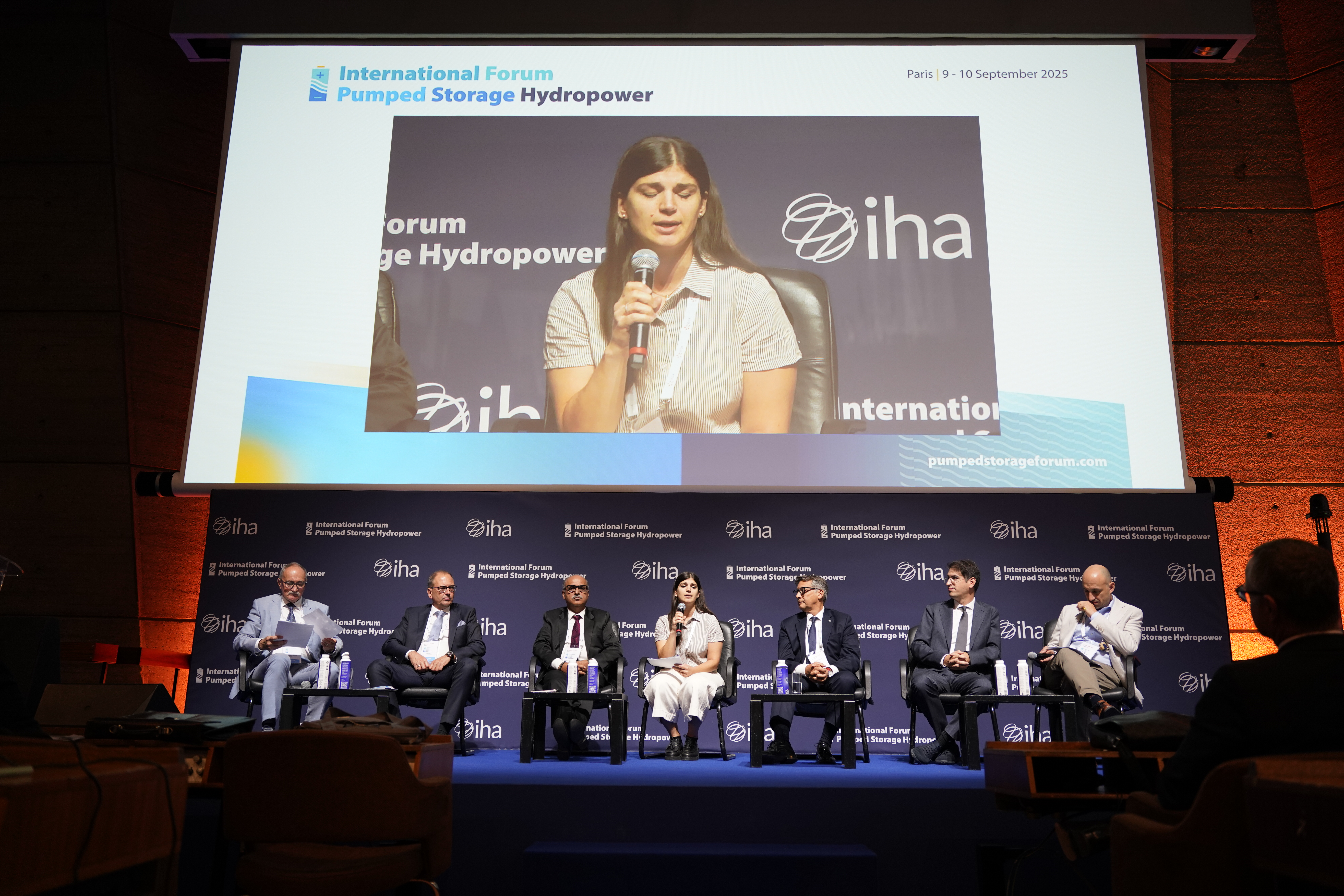UNIFYING THE VOICES OF HYDROPOWER
Latest News
Hydropower for a Resilient, Secure and Competitive Europe
ETIP HYDROPOWER and EERA launch joint FP10 position paper
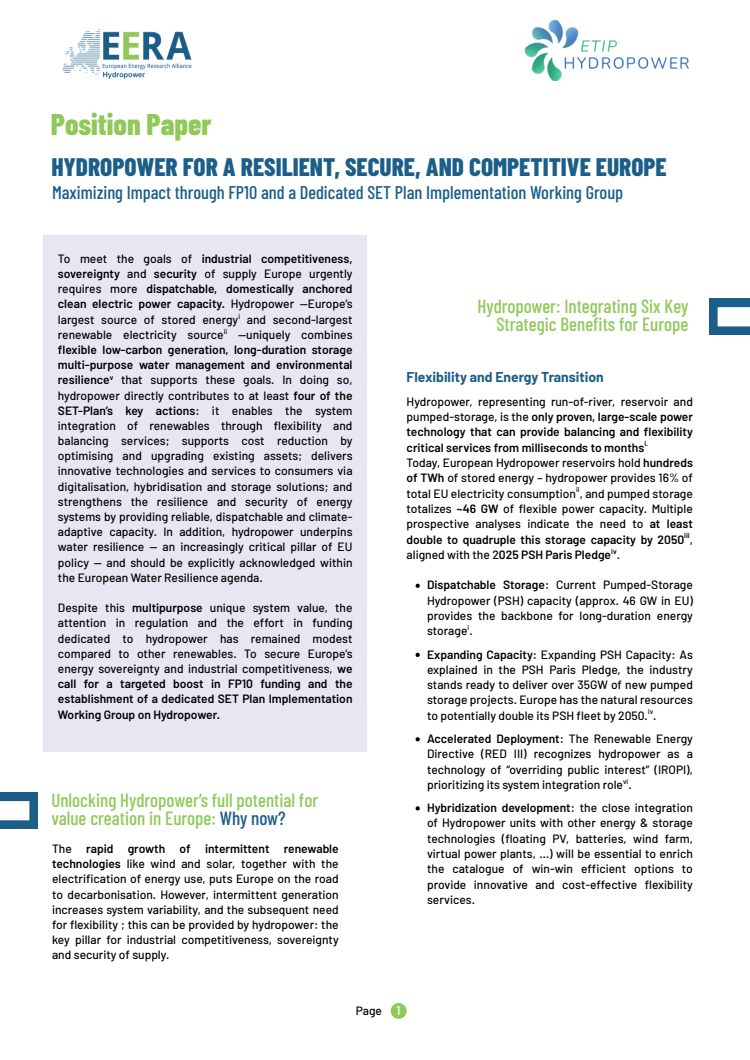
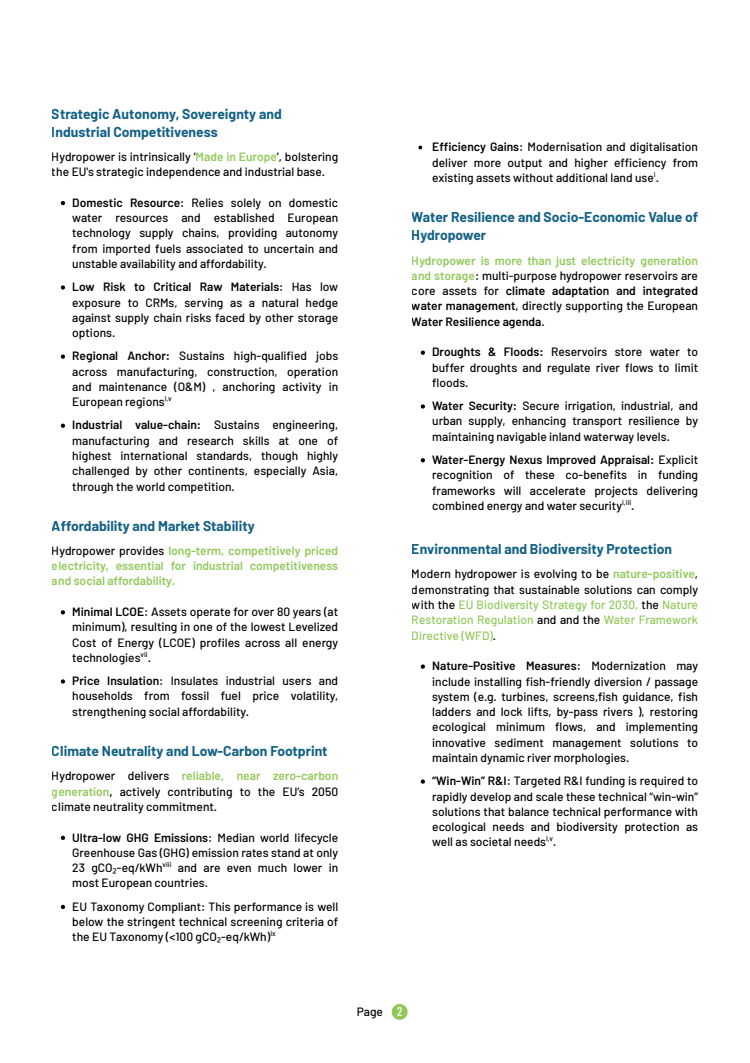
ETIP HYDROPOWER and the EERA Joint Programme Hydropower have jointly released a new position paper calling for stronger recognition of hydropower in the next EU Framework Programme (FP10) and for the establishment of a dedicated SET Plan Implementation Working Group on Hydropower
Titled “Hydropower for a Resilient, Secure, and Competitive Europe”, the paper underlines that achieving Europe’s objectives on industrial competitiveness, sovereignty and security of supply requires increased dispatchable, domestically anchored clean electricity capacity — a role that hydropower is uniquely equipped to fulfil.
A strategic asset for Europe’s energy system
As electrification accelerates and variable renewables expand, Europe’s power system requires more flexibility and long-duration storage. Hydropower — including reservoir, run-of-river and pumped-storage — is the only proven large-scale technology capable of providing balancing services from milliseconds to seasonal storage.
Today, hydropower accounts for 16% of EU electricity consumption, while pumped-storage hydropower provides around 46 GW of flexible capacity across Europe. Multiple analyses indicate that storage capacity will need to at least double by 2050 to ensure system stability in a climate-neutral energy system.
Beyond flexibility, the paper highlights hydropower’s integrated contribution to:
- Strategic autonomy and industrial competitiveness
- Affordable and stable electricity prices
- Climate neutrality and low lifecycle emissions
- Water resilience and climate adaptation
- Environmental protection and biodiversity
- Addressing the funding gap
Despite its system-wide value, hydropower has historically received limited EU research and innovation support. Between 1995 and 2015, it represented only 1% of total renewable energy R&I funding under EU Framework Programmes.
The joint paper therefore calls for:
- A targeted increase in hydropower funding under FP10;
- Stronger coordination of research, innovation and industrial deployment through a dedicated SET Plan Implementation Working Group on Hydropower
The document also sets out ten priority research and innovation areas covering climate adaptation, pumped-storage expansion, digitalisation, environmental performance, manufacturing innovation, market design and GHG accounting.
With FP10 discussions underway, ETIP HYDROPOWER and EERA emphasise that hydropower is a Made-in-Europe technology that strengthens energy security, competitiveness and resilience. Ensuring its full integration into Europe’s research and innovation agenda is essential for a secure and decarbonised power system.
The Digital Future of Hydropower: The Di-Hydro Podcast SeriesHydropower has been a cornerstone of Europe’s energy system for decades. It is reliable, flexible, and renewable. Yet today, hydropower operators face new challenges: ageing infrastructure, increasing climate variability, environmental constraints, soaring energy demands, and the need for more efficient and data-informed decision-making. To explore how these challenges can be tackled by digital innovation, the Di-Hydro project has launched the Di-Hydro Podcast Series. This podcast focuses on the digital transformation of hydropower. The podcast is designed to bridge research, industry, and practice, offering listeners a clear view of how emerging digital tools are being applied to real hydropower systems across Europe. What is the Di-Hydro Podcast about?The Di-Hydro Podcast Series takes listeners on a journey from the historical origins of hydropower to where it is now, and, most importantly, where is it going. Through accessible yet technically grounded discussions, the series explores how technologies such as sensors, Artificial Intelligence, predictive analytics, and Digital Twins can change how hydropower plants are operated, maintained, and integrated into modern energy systems. Rather than focusing on theory alone, the podcast highlights practical solutions developed within the Di-Hydro project, an EU-funded initiative working to support hydropower plant managers and operators with better insights into infrastructure health, environmental conditions, and operational performance. At its core, the podcast asks a simple but crucial question: Voices from the project and beyondEach episode of the Di-Hydro Podcast features experts directly involved in the project, including researchers, engineers, and technicians from both the digital technology and hydropower sectors. The conversations focus on to unpack complex topics without oversimplifying them, making the podcast relevant both to sector professionals and to a broader audience interested in renewable energy and sustainability in Europe. From history to digital innovation: episodes so farThe series opens with Episode 0 – Discovering Hot Water: Hydropower in History, which takes listeners back to the roots of hydropower. From ancient water wheels in Greece and China to the first hydroelectric plants of the 19th century, the episode sets the stage by showing that hydropower has been there to fuel human ingenuity. Episode 1 – From History to Digital Innovation: the Di-Hydro project moves firmly into the present. In this episode, listeners are introduced to the Di-Hydro project itself through a conversation with the project coordinator Dr. Alkiviadis Tromaras from CERTH. The discussion focuses on how digital tools can help hydropower plants “understand themselves” better. In fact, by monitoring infrastructure conditions, anticipating failures, and supporting maintenance planning before problems become critical, it is possible to make hydropower plants more efficient, resilient to environmental changes, and possible produce more energy. Future episodes will dive deeper into specific aspects of the project, including:
How Di-Hydro approaches digitalised hydropowerAt a high level, Di-Hydro aims to reduce uncertainty in hydropower operations. By combining historical data, real-time sensor information, and advanced digital models, the project develops tools that help operators answer questions such as:
Rather than replacing human expertise, Di-Hydro’s digital solutions are designed to support decision-making, offering plant managers clearer insights and stronger evidence when planning maintenance and operational strategies. What will you find in the Di-Hydro Podcast series?Listeners to the Di-Hydro Podcast can expect:
The podcast is available on major podcast platforms, including Spotify, Amazon Music, and others, making it easy to follow and listen on any device. Stay connected: subscribe to the Di-Hydro NewsletterTo stay up to date with new podcast episodes, project milestones, and broader developments in hydropower and digitalisation, readers are invited to subscribe to the Di-Hydro Newsletter. |
Our 2025 Journey: Key Developments and What Comes NextIt’s a wrap! As we reach the end of the year, we would like to take a moment to reflect on a period marked by strengthened collaboration and increased efforts for more visibility for hydropower within Europe’s agenda. This year, ETIP HYDROPOWER delivered a set of key results that have already reached a wide audience across the sector. Our White Papers on flexibility, biodiversity, and climate change, together with a series of educational videos, have provided stakeholders with accessible and reliable references on hydropower’s role in addressing critical challenges. These materials continue to support policymakers, researchers, and industry actors in understanding how hydropower can contribute to a resilient and sustainable energy system. We were also pleased to organise a site visit to the Kühtai pumped storage hydropower plant under development. This visit offered an invaluable opportunity for in-person exchanges, technical discussions, and strengthened cooperation within our community. Our collaboration with EU-funded projects has grown significantly as well. The cluster advanced joint work, co-organised sessions, and increased its presence at major events. In 2025, this collaboration will be further strengthened through coordinated activities at the Paris Pumped Storage Forum, HYDRO 2025, and the annual Hydropower Day, among others. These efforts aim to reinforce and amplify the visibility of research and innovation in Europe. Looking ahead, exciting developments are already in preparation. We are working on new strategic documents, exploring broader engagement with our stakeholders, and shaping new activities to continue supporting the sector. As ETIP HYDROPOWER closes this year, we also approach the end of our current funding period. While we await news on the next phase, we are encouraged by the growing strength of our community. Continued visibility and support for hydropower will remain essential to delivering the energy transition Europe needs. Thank you for being part of the ETIP HYDROPOWER community. We look forward to an impactful year ahead! |
The Role of Flexibility and Storage at ENLIT EUROPE 2025Hydropower took center stage at this year’s ENLIT EUROPE in Bilbao, Spain, where a dedicated session in the Generation Hub "Hydropower Projects & Innovation: From showpiece pump storage projects to modernisation" which highlighted the sector’s crucial role in Europe’s evolving energy landscape. Representing ETIP HYDROPOWER, Prof. Anton Schleiss delivered a keynote presentation titled Hydropower flexibility and storage as a catalyst for a successful energy transition. He began with an overview of ETIP HYDROPOWER’s mission and activities, emphasizing the platform’s work to drive innovation and collaboration across the hydropower community. Prof. Schleiss underscored how recent events (notably the 2022 energy crisis and the 2025 blackout in Spain) have demonstrated the indispensable role of hydropower in ensuring Europe’s secure and resilient electricity supply. He stressed that the modernisation and extension of existing hydropower plants, along with the development of new pumped-storage facilities, are becoming increasingly attractive and necessary investments to meet flexibility and storage needs. Drawing on insights from ETIP HYDROPOWER’s Working Group on Flexibility, Prof. Schleiss referenced the group’s White Paper and explanatory video, which together illustrate how hydropower can act as a cornerstone of Europe’s clean and reliable energy transition. The session, chaired and moderated by Myrto Tripathi, General Director of Terrawater Institute, featured additional perspectives from leading industry figures. Izaskun Rica Ugarte, Hydropower Electrical Engineering Manager at Iberdrola, discussed advances in pumped-storage hydropower, while Emilie-Marie Mercier, R&D European Projects Director at EDF, presented Hydropower for a Competitive Europe: The Value of EU Funding and R&I, highlighting the importance of research, innovation, and European cooperation in maintaining hydropower’s competitiveness.
|
Towards Nature-Positive Hydropower: ETIP HYDROPOWER Publishes Three Biodiversity White Papers
Brussels, 20 November 2025 — ETIP HYDROPOWER released last thursday 20th November three new White Papers dedicated to biodiversity, focusing on some of the most relevant interactions between hydropower operations and river ecosystems: fish mobility, environmental flows and hydropeaking, and sediment dynamics. Developed by experts from Working Group 2, the series compiles state-of-the-art knowledge, European practices, and recommendations to support hydropower operators, researchers, and policy makers in advancing environmentally sustainable hydropower. White Paper on Enabling Fish Mobility at Hydropower PlantsThis paper highlights the role of fish migration in maintaining river connectivity and biodiversity. It reviews current technologies and solutions to improve upstream and downstream passage, including nature-like and technical fishways, fish lifts, bypass systems, behavioural guidance structures, and fish-friendly turbines. It stresses the need for:
Download the White Paper on Fish Mobility White Paper on Environmental Flows and HydropeakingThis paper explores how environmental flows (E-flows) and hydropeaking management can reconcile river ecosystem needs with flexible hydropower production. It summarises methodologies applied across Europe (from hydrological and habitat-based to integrative approaches) and provides guidance for their implementation. Key recommendations include:
Download the White Paper on E-flow and Hydropeaking White Paper on Sediment DynamicsSediment transport is essential to river morphology, habitats, and infrastructure resilience. This White Paper explains how hydropower operations alter sediment continuity and outlines a comprehensive set of management measures to address it: such as sediment flushing, sluicing, venting, bypassing, replenishment, and dredging. Its main messages include:
Download the White Paper on Sediment Dynamics Together, the three White Papers illustrate practical ways to achieve “win-win” solutions between hydropower operation and river ecology. They provide knowledge that supports the objectives of the EU Water Framework Directive, the Nature Restoration Regulation, and the Renewable Energy Directive (RED III), contributing to Europe’s broader goals for a climate-resilient and nature-positive energy transition. |
ETIP HYDROPOWER at AQUAWATT Forum: Uniting Europe’s Hydropower voices for a Sustainable Energy FuturePiacenza, Italy — 30 November 2025. At the AQUAWATT Forum, a workshop titled “ETIP HYDROPOWER: Shaping the Future of Sustainable Hydropower in Europe” presented the European Technology and Innovation Platform on Hydropower (ETIP HYDROPOWER) to stakeholders from industry, research, and policy. Hydropower remains a vital component of Europe’s clean energy transition, providing flexible, reliable, and renewable electricity. The workshop underscored how ETIP HYDROPOWER is designed to unify the sector’s voice, promote innovation and sustainability, and align strategic actions with EU climate and energy objectives. Platform mission and governanceAntonella Frigerio, Vice Director at RSE and Co-Chair of the ETIP HYDROPOWER Governing Board, opened the session by outlining the platform’s mission, structure, and strategic priorities. She emphasised the need to reposition hydropower as a central pillar of the European Green Deal—able to deliver flexibility, storage, and climate resilience. Frigerio also highlighted the importance of Research and Innovation Agendas (RIA) and the Strategic Industrial Roadmap (SIR) to guide future developments, and called for stronger recognition of hydropower within EU policy frameworks. Sector challenges and recommended actionsJean-Jacques Fry, representing the ETIP HYDROPOWER Secretariat, identified three priority challenges for scaling hydropower deployment across Europe:
To address these, Fry recommended:
Preview of ETIP HYDROPOWER White PapersThe workshop also served as the exclusive preview of the ETIP HYDROPOWER White Papers developed by the platform’s Working Groups:
In addition, a short video on hydropower’s flexibility potential was premiered, showcasing real-world examples of how hydropower assets across Europe are supporting the integration of variable renewables and enhancing system reliability. World Hydropower Outlook 2025Matteo Bianciotto of the International Hydropower Association (IHA) presented insights from the World Hydropower Outlook 2025, including:
Policy momentum: the Paris PledgeBianciotto also introduced the Paris Pledge, a declaration signed by more than 50 European stakeholders calling for:
The pledge was formally presented to the European Commission in Brussels on 11 September 2025, reinforcing the sector’s commitment to a resilient and decarbonised energy system. |
ETIP HYDROPOWER Contributes to Key Discussions at HYDRO 2025The HYDRO 2025 Conference in Thessaloniki, Greece (22-24 October 2025), brought together over 1,000 participants to discuss innovation from almost 70 countries, to discuss topics ranging from dam safety and environmental management to climate resilience, artificial intelligence applications, and the growing role of pumped storage in renewable energy integration. Anton Schleiss, Coordinator of ETIP HYDROPOWER, chaired the session on European initiatives supporting hydropower, where five presentations showcased the results of ongoing EU-funded R&I projects. Schleiss also lectured at the pre-conference workshop on pumped storage hydropower, presented the latest achievements of ETIP HYDROPOWER at the IEA Hydro TCP Executive Committee Meeting, joined a World Bank–led roundtable on sedimentation management, and delivered a technical talk on piano key weirs and wooden debris impacts in the Gates and Spillways session. Denis Aelbrecht, Chair of the ETIP HYDROPOWER Governing Board, chaired the session on Climate change – risk and resilience, while Emanuele Quaranta, Chair of the Working Group on Promotion, Dissemination and Uptake of European R&I Projects, contributed to the Small Hydro session with a presentation on the potential and opportunities for small hydropower in the European Union and the role of emerging policies. He also introduced the European initiatives supporting hydropower session with reflections on how excellence in science and industrial innovation can jointly strengthen Europe’s hydropower sector and policy impact. During the event, Anton Schleiss, Denis Aelbrecht, and Emanuele Quaranta met with representatives of the European Commission’s DG International Partnerships (Pau Guix Ruiz and Michel Caubet) to discuss ongoing initiatives under the Global Gateway strategy, exploring opportunities to promote public–private hydropower projects worldwide with European sector involvement. Several other ETIP HYDROPOWER members contributed to the programme, including Sera Lazaridou and Klaus Jorde (Governing Board members) as well as Atle Harby, Cécile Munch Alligné, Luc Deroo, and Miroslav Marence (Scientific Advisory Board members). Through active participation at HYDRO 2025, ETIP HYDROPOWER highlighted its continued efforts to develop sustainable hydropower solutions and to connect scientific, industrial, and policy perspectives across Europe. |
Hydropower and Sustainability in Focus at SHF HydroES 2025On 17–18 September 2025, the SHF HydroES Conference in Grenoble, France, brought together experts and stakeholders to advance knowledge on hydropower and environmental sustainability. The event provided an important platform for presenting the latest work developed within the ETIP HYDROPOWER Working Groups. Denis Aelbrecht, Chair of the Governing Board, opened the session with an introduction to ETIP HYDROPOWER and later offered closing reflections. Maryse François presented the White Paper on Flexibility, inviting participants to continue the conversation during the upcoming webinar scheduled for 8 October 2025. Agnès Barillier followed with a presentation of the main messages from the White Paper on E-flows and Biodiversity, while Benjamin Graff shared preliminary insights from the forthcoming White Paper on Climate Change, which will soon be made publicly available. The two-day conference concluded with a series of technical visits that offered participants hands-on insights into hydropower innovation and sustainability. At the EDF Cheylas pumped storage plant, participants explored sediment management solutions developed by Watertracks through the Nessie technology. At the SuperGrid Institute, the group visited the TM1 Scaled Model test platform (IEC 60193) and the HydroPHIL transient platform, and took part in discussions on hybridisation with batteries, variable speed solutions and the economic value of hydropower in electricity markets. The programme also included a visit to the ARTELAB Modelling Laboratory, managed by Artelia.
|
ETIP HYDROPOWER Cluster Showcases European Hydropower Innovation at the International Forum on Pumped StorageETIP HYDROPOWER participated as BRONZE Partner at the International Forum on Pumped Storage Hydropower, held at UNESCO Headquarters in Paris. This high-level global event marked the culmination of a year-long campaign from the International Hydropower Association (IHA) to accelerate action on pumped storage hydropower: the “unsung hero” of the energy transition. At the Forum, ETIP HYDROPOWER, together with Di-Hydro and STOR-HY, represented the ETIP HYDROPOWER Cluster on the exhibition hall, gathering together some of the most ambitious European projects dedicated to advancing hydropower technology and energy storage solutions. The cluster showcased the latest EU Horizon Europe projects, including: iAMP-Hydro, D-Hydroflex, SHERPA, HYDRO4U, ReHydro, RevHydro, XFLEX-HYDRO, HYPOSO, Store2Hydro, and H-HOPE. Together, these projects embody Europe’s leadership in developing sustainable, flexible, and environmentally responsible hydropower systems. The Forum took place at a critical moment for global climate action. At COP29, 58 nations committed to the Global Energy Storage and Grids Pledge, setting the ambitious target of deploying 1,500 GW of energy storage, doubling grid investments, and expanding 25 million km of new grid infrastructure by 2030. Hydropower—and particularly pumped storage, which already accounts for around 90% of global long-duration energy storage—will play a decisive role in making these targets a reality. Despite its proven value and relatively small environmental footprint, pumped storage remains largely unknown to the public. The IFPSH gathered Heads of State, Ministers, CEOs, financial institutions, intergovernmental organisations, and industry leaders to raise awareness and agree on the policies and practices needed to unlock new development.
|
Innovating for Grid Flexibility: ETIP HYDROPOWER Co-Moderates one of the sessions at the International Forum on Pumped StorageAt the International Forum on Pumped Storage Hydropower, one of the most anticipated sessions, “Innovating for Grid Flexibility: New Technology Showcase”, highlighted how pumped storage hydropower (PSH) is evolving to meet the demands of renewable-dominated power systems. The session was co-moderated by Prof. em. Dr. Anton Schleiss, Coordinator of ETIP HYDROPOWER, together with Matteo Bianciotto, Policy and Research Director at the International Hydropower Association (IHA), which is also a partner of ETIP HYDROPOWER. Their moderation reflected ETIP HYDROPOWER’s active role in guiding Europe’s hydropower innovation agenda. Innovation at the heart of PSHThe debate demonstrated that although PSH is a mature and proven technology, it is constantly adapting to address new challenges. Experts exchanged views on variable speed technology, battery–turbine hybridisation, hydraulic short circuit solutions, plant digitalisation, and design and construction challenges. Case studies and perspectivesThe panel brought together a wide range of international expertise:
Opening the session, Alexander Speckle presented the Kühtai 2 Pumped Storage Plant in Austria, which expands an existing facility to cover winter electricity shortages. He explained how the project integrates variable speed machines and a new reservoir to provide around 0.2 GWh of additional storage. He also underlined that more than €100 million have been invested in environmental mitigation to secure stakeholder trust. During the debate, Romain Pellegrino stressed that hydropower “remains crucial to balance variable renewables” and warned that regulatory frameworks in Europe are not keeping pace with system needs. Elena Vagnoni shared findings from the XFLEX-HYDRO project, noting that digitalisation and real-time optimisation can “increase efficiency, reduce fatigue, and extend equipment lifetime.” Danilo Moresco emphasised ABB’s investment in innovation, highlighting the role of digital twins, cloud-based architectures, and AI, while underlining the need for “collaboration across utilities, startups, and universities.” From India, Parveen Nanda presented the Pinnapuram Integrated Renewable Project, the world’s first large-scale combination of 4.5 GW of wind, solar, and PSH under a single grid connection. He explained that hybrid approaches, including batteries and advanced sensors, were essential to keep costs manageable while providing flexibility. Looking aheadThe session confirmed that pumped storage is far from a “done and dusted” technology. From digitalisation and hybridisation to new partnership models, innovation is reshaping the sector worldwide. By co-moderating this high-level debate, ETIP HYDROPOWER reaffirmed its leadership in advancing hydropower innovation in Europe, while connecting with global pioneers shaping the clean energy transition.
|


